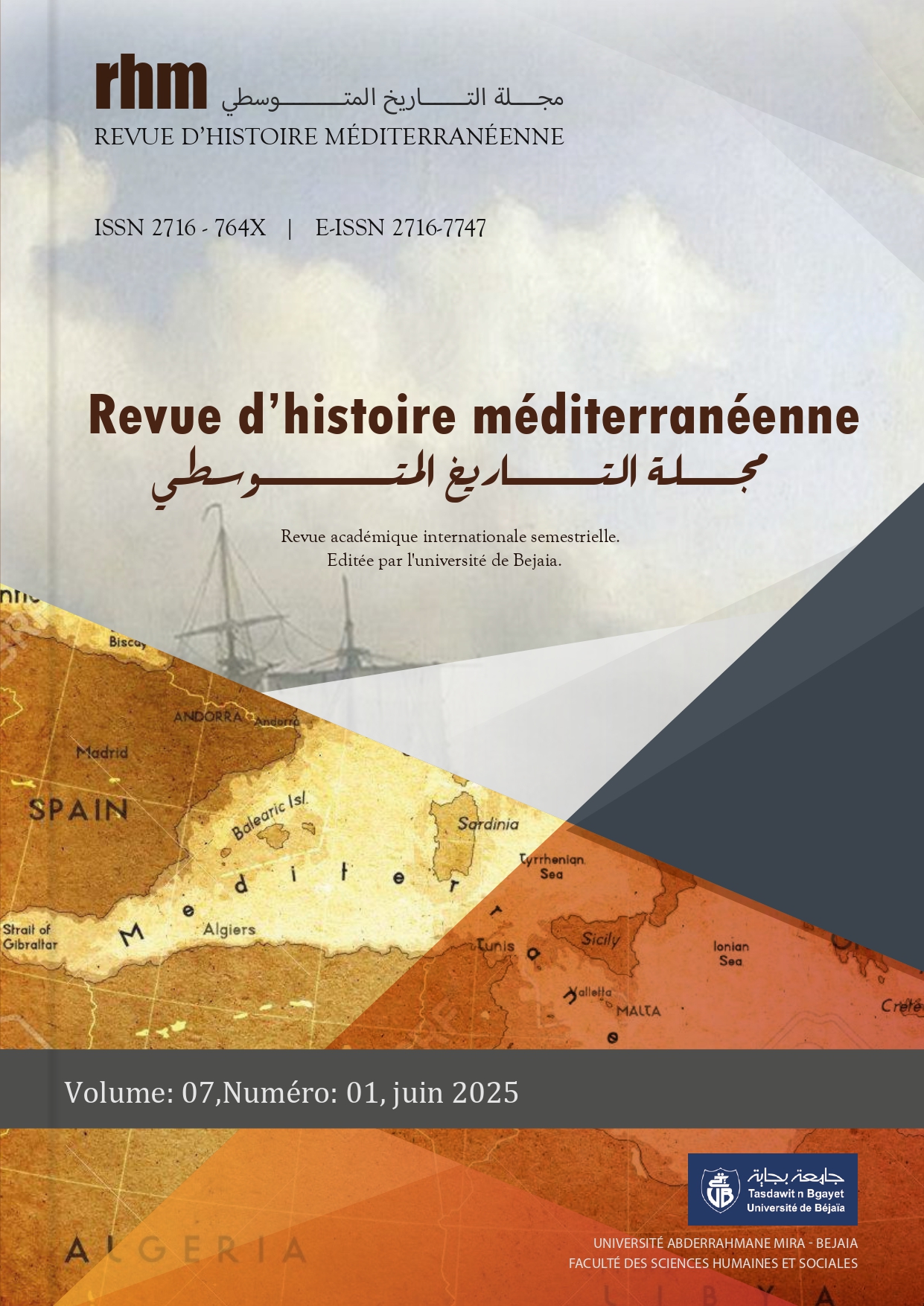العائد المعرفي التاريخي من رسالة الخليفة عبد المؤمن بن علي إلى أولي الحكم والمسؤوليات بالأندلس (543ه/1148م) ــ قراءة تحليلية
The historical knowledge derived from the message of caliph Abd al-Mu'min ibn Ali to the rulers and authorities of Al-Andalus (543 AH/1148 CE) - An analytical reading
Résumé
معلوم أنّ البحوث الجادّة في الحقل التاريخي تحديدًا قد تجاوزت الاعتماد على نمطٍ مصدري معيّن، بل تسعى إلى تتبع المعطيات التاريخية في مختلف المظان والمدونات؛ ككتب الرحلة والبلدان، أو مصادر التراجم والمناقب، أو مدونات النوازل والحسبة، ناهيك عن كتب الحوليات ومؤلفات الأدب السياسي، فالإحاطة الشاملة بالحيثية التاريخية المرغوب دراستها تستدعي الإلمام بكل ما له علاقة بها، حتّى وان كان المُدَون في أساسه غير رامٍ للمعلومة التاريخية، ولعلّ أبرز نماذج هذا الطرح ما تتضمّنه الرسائل الديوانية من عائدٍ معرفي تاريخي لا يقلّ قيمة عما تورده الأشكال المصدرية السابقة، ولهذا تهدف هذه الورقة البحثية في محورها الفرعي إلى الإفصاح عن موقع وعائد الرسائل الديوانية في قائمة المصادر التاريخية، في حين يكون المحور الأساس؛ رسم ملمح تاريخي لمرحلة انتقالية شهدتها دولة الموحدين، ارتكازًا على قراءة في مضامين رسالة الكاتب جعفر بن محمد بن عطية (ت 553ه/1158م) الصادرة عن الخليفة عبد المؤمن بن علي الكومي (ت 558هـ/1163م) إلى أولي الحكم والمسؤوليات في بلاد الغرب الإسلامي سنة 543ه/1148م، وهذا انطلاقًا من هذه الإشكالية: ما طبيعة العائد المعرفي الذي تُضيفه الرسائل الديوانية إلى الحقل التاريخي من خلال أنموذج الرسالة المُعالَجة؟، وإنّ الدّراسة الأمثل لطبيعة هذا الموضوع تقتضي انتهاج المنهج التحليلي بأليته النقدية، وهذا لما تحويه هذه الرسالة من معطيات إخبارية عن سياق تاريخي مضطرب من عديد النواحي، فإذا ما قيل العدوة المغربية؛ استُحضر العداء المرابطي الموحدي، وسلسلة التمردات والثورات الانقلابية على الحكم الموحدي، أمّا العدوة الأندلسية فلم تكن أحسن حالًا من نظيرتها في المغرب، فقد تفشت الآفات الاجتماعية والأخلاقية؛ من شرب للخمر، وقطع للسبيل، وبيعٍ للنّساء، وتعدٍّ على الأرواح، ولهذا وجب إخضاع هذه المادة التاريخية الواردة في صلب الرسالة للتحليل والنقد استئناسًا بالمصادر المُزامنة للحدث الموحدي على غرار كتاب "نظم الجمان"، "والحلل الموشية"، "و المن بالإمامة"، "والمعجب"، ومراجع لا تقل قيمةً عن المصادر السالفة، ومن بينها كتاب "البيان المغرب"، "وروض القرطاس"، وهذا قصد رسم صورة واضحة عن هذه المرحلة.
مضمون البحث لا ينفك عن الإطار العام لهذا الموضوع؛ بدءًا بالتأسيس المفاهيمي للفظة الرسالة في حقليها اللّغوي، والاصطلاحي التاريخي، ثمّ تبيان أنواعها وموضوعاتها، وما تحمله من إضافات معرفية في بناء الحدث التاريخي، كما تمّت الإشارة إلى المحاذير المُستوجب مراعاتها خلال الرجوع إلى هذه الرسائل، ليكون الشقّ الثاني قراءة تحليلية للرسالة محل الدّراسة وفق ما تُمليه الضوابط المنهجية؛ من تعريفٍ للنّص، وتحليله، والتّعليق عليه، ختامًا بالمستخلصات من تحليل هذه الوثيقة.
من نتائج هذا البحث أنّه يُبيّن لنا حجم العدوان المُسلط على ساكنة الأندلس من طرف أخوي المهدي بن تومرت ـــ عيسى وعبد العزيز ـــ وما آلت إليه أوضاع الحكم في هذه البلاد خاصة إزاء الّا مبالات من طرف الأشياخ والطلبة ومن صَحِبهم في الأمر والسلطة، ومن النتائج المُستوجب الإشارة إليها في هذا البحث كذلك، تلك الرغبة الجامحة من طرف عبد المؤمن في تحقيق الحق وإبطال الباطل، استكمالًا للمشروع الإصلاحي الّذي جاء به ابن تومرت، والّذي كان شعاره الأساس "الأمر بالمعروف والنّهي عن المنكر"، وهذا الّذي يقف عليه القارئ لهذه الرسالة من خلال ملاحظته لمسلكين سلكهما عبد المؤمن في خطابه؛ خطاب دعوي ترغيبي، وآخر تعنيفي ترهيبي، وإنّ هذا الاعتدال في الخطاب مردّه الأساس إلى الرغبة في إدامة الملك الموحدي.











